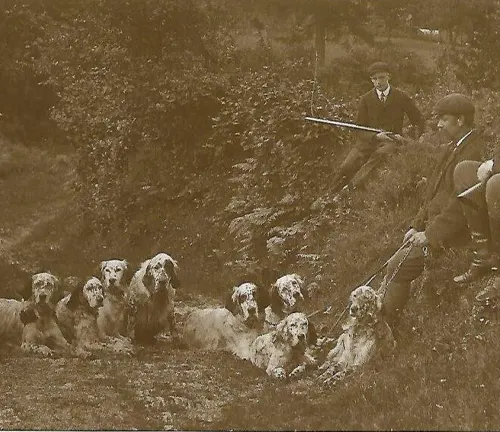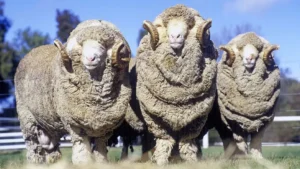English Setters
- February 1, 2024
- 0 comment
The English Setter, a breed renowned for its elegance and versatility, is a captivating and affectionate companion. These medium to large-sized dogs are characterized by their striking belton coat pattern, which comes in various color combinations such as blue, orange, lemon, and tricolor. With a lifespan of approximately 10 to 12 years, English Setters are known for their friendly and gentle temperament, making them exceptional family pets.

They possess a high level of energy, necessitating regular exercise and mental stimulation to keep them content. This breed’s intelligence and eagerness to please make them responsive to positive reinforcement training methods. While they may have a propensity to bark when excited or sensing something unusual, English Setters are generally sociable with both people and other dogs. Regular grooming, including brushing and occasional baths, is necessary to maintain their long, silky coat. Overall, the English Setter is an intelligent, active, and loving breed, well-suited to families and individuals alike.
| Characteristic | Description |
|---|---|
| Breed Name | English Setter |
| Size | Medium to large |
| Weight | 45 to 80 pounds (20 to 36 kg) |
| Height | 24 to 27 inches (61 to 69 cm) at the shoulder |
| Coat Type | Long, silky, feathered |
| Coat Colors | Various belton patterns, including blue, orange, lemon, and tricolor |
| Lifespan | 10 to 12 years |
| Temperament | Friendly, affectionate, gentle, and playful |
| Energy Level | High energy, requires regular exercise |
| Intelligence | Intelligent, eager to please |
| Socialization | Friendly with people and other dogs |
| Grooming Needs | Regular brushing, occasional baths, ear cleaning |
| Training | Positive reinforcement methods, early socialization |
| Common Health Issues | Hip dysplasia, ear infections, hypothyroidism, bloat, cancer |
| Suitability for Families | Excellent, good with children |
| Adaptability | Prefers homes with yards but can adapt to apartment living with sufficient exercise |
| Barking Tendency | Moderate, may bark to alert or when excited |
The Epitome of Elegance and Versatility

English Setters, often simply known as Setters, are a breed of dogs that embody both elegance and versatility. These graceful canines are celebrated for their unique appearance, remarkable hunting abilities, and affectionate nature. In this comprehensive article, we will delve into the world of English Setters, exploring their history, characteristics, temperament, training needs, and more.
History of English Setters
English Setters have a rich history dating back to the 16th century. They were initially bred in England for bird hunting, specifically for setting game birds by crouching or “setting” in a distinctive pose. Their lineage can be traced to various breeds, including the Spanish Pointer and Water Spaniel. Over centuries of careful breeding, they developed into the elegant dogs we know today.

Distinctive Appearance
English Setters are easily recognizable by their distinct coat pattern, known as belton. Their long, silky fur comes in various color combinations, with the most common being blue belton, orange belton, lemon belton, and tricolor. Their feathery tails and expressive, almond-shaped eyes add to their charming appearance.



- Belton Coat Pattern: English Setters have a striking coat pattern known as “belton.” This pattern consists of various speckled or ticked spots on a predominantly white background. The most common belton colors include blue belton (black and white), orange belton (orange and white), lemon belton (lemon and white), and tricolor (black, white, and tan). This coat pattern sets them apart from many other breeds.
- Feathery Tail: English Setters have a long, elegant tail adorned with feathering, which refers to the longer, silky fur on their tail’s underside. This feathery tail adds to their graceful appearance and is a distinctive feature of the breed.
- Almond-Shaped Eyes: Their eyes are expressive and almond-shaped, giving them a soft and gentle look. They usually have a kind and friendly expression in their eyes, reflecting their friendly temperament.
- Elegant Build: English Setters have a well-proportioned and graceful build. They are a medium to large breed with a lean body, a deep chest, and long, straight legs. Their overall appearance exudes elegance and athleticism.
- Long, Pendulous Ears: They have long, drooping ears that are covered with silky fur. These ears not only contribute to their distinctive appearance but also serve a practical purpose in aiding their hunting abilities by funneling scents towards their nose.
- Muscular Neck and Head: English Setters have a muscular neck that leads to a refined head. Their head is well-proportioned with a distinct stop (the angle between their forehead and muzzle) and a well-defined, square-shaped muzzle.
Temperament and Personality
One of the most endearing qualities of English Setters is their friendly and gentle temperament. They are known for being affectionate and sociable, making them great family pets. Their boundless energy also makes them excellent companions for active individuals or families. However, it’s important to note that their hunting instincts can make them easily distracted, so proper training is essential.



- Friendly and Affectionate: English Setters are known for their friendly and affectionate nature. They are social dogs that enjoy being around people and other pets. They often form strong bonds with their human family members and thrive on companionship and attention.
- Gentle Demeanor: These dogs typically have a gentle demeanor, making them excellent choices for families with children. They are patient and tolerant, which means they can handle the curiosity and energy of kids well.
- Playful and Energetic: English Setters are known for their playful and energetic disposition. They have a youthful exuberance that can be infectious, making them great playmates for active individuals and families. Regular playtime and exercise are essential to keep them happy and healthy.
- Intelligent and Trainable: This breed is known for its intelligence and eagerness to please. They tend to pick up on commands quickly and respond well to positive reinforcement training methods. However, it’s important to note that they can be easily distracted due to their strong hunting instincts, so consistent training is key.
- Curious and Inquisitive: English Setters are naturally curious dogs. They have a keen sense of smell and are often on the lookout for interesting scents, which can lead them to explore their surroundings. This curiosity is part of their hunting heritage.
- High Energy Levels: Due to their hunting background, English Setters have high energy levels. They require regular exercise and mental stimulation to prevent boredom. Engaging them in activities like fetch, hiking, or agility can help burn off their excess energy.
- Alert and Protective: While they are generally friendly, English Setters can also be alert and protective of their family. They may bark to alert you of any unusual activity or strangers approaching your home.
- Sociable with Other Pets: With proper socialization from a young age, English Setters can get along well with other pets in the household. However, their hunting instincts may lead them to chase smaller animals, so supervision is necessary.
Training English Setters
Training English Setters can be a rewarding experience, but it requires patience and consistency. Due to their intelligence and eagerness to please, they respond well to positive reinforcement methods. Early socialization is crucial to ensure they get along with other pets and people. Engaging in activities like obedience training and agility can help channel their energy in a positive way.


- Basic Obedience Training: Start with basic obedience commands such as sit, stay, come, and heel. These commands establish a foundation for communication and ensure your Setter understands and follows your instructions.
- Socialization: Early socialization is crucial for English Setters to help them become well-adjusted and friendly dogs. Expose them to various people, animals, environments, and situations to build their confidence and reduce the likelihood of fear or aggression towards new experiences.
- Positive Reinforcement: English Setters respond well to positive reinforcement techniques, which involve rewarding good behavior with treats, praise, or affection. This positive approach motivates them to repeat desired behaviors and strengthens the bond between you and your dog.
- Hunting Training (If Applicable): If you plan to use your English Setter for hunting, consider specialized hunting training. This includes teaching them to “set” or point out game birds without disturbing them. Professional trainers with experience in gun dog training can help you develop these skills.
- Exercise and Mental Stimulation: English Setters have high energy levels and require both physical and mental exercise. Incorporate activities like fetch, agility training, puzzle toys, and scent games into their routine to keep their minds engaged and prevent boredom-related behaviors.
Health Considerations
Like all breeds, English Setters are prone to certain health issues. Common concerns include hip dysplasia, ear infections due to their floppy ears, and hypothyroidism. Regular vet check-ups and a balanced diet can help mitigate these risks and ensure a long and healthy life for your Setter.
Hip Dysplasia
Hip dysplasia is a genetic condition where the hip joint doesn’t develop properly. It can lead to pain, lameness, and arthritis. Regular vet check-ups and maintaining a healthy weight can help manage this condition.
Ear Infections
Due to their floppy ears and a tendency to retain moisture, English Setters are susceptible to ear infections. Regular ear cleaning and ensuring their ears are dry after swimming or bathing can help prevent these infections.

Hypothyroidism
Hypothyroidism is a hormonal disorder that affects the thyroid gland’s function. Symptoms may include weight gain, lethargy, and skin issues. Routine blood tests can help diagnose and manage this condition.
Bloat
English Setters, like many deep-chested breeds, can be at risk of bloat, a potentially life-threatening condition where the stomach fills with gas or fluid. Feeding smaller, frequent meals and avoiding vigorous exercise after eating can help reduce the risk.
Cancer
English Setters can be prone to various types of cancer, including lymphoma and hemangiosarcoma. Regular check-ups and early detection are crucial for managing and treating cancer if it occurs.
Different Species
The English Setter is a specific breed of dog, and there are no different species of English Settler. However, within the breed itself, there may be different lines or strains developed by breeders, each with its own characteristics and traits.

Frequently Asked Question (FAQs)
- Are English Setters hypoallergenic?
No, English Setters are not hypoallergenic. They shed a moderate amount of fur, and some individuals may trigger allergies in sensitive individuals. - What is the average lifespan of an English Setter?
The average lifespan of an English Setter is typically between 10 to 12 years with proper care. - Do English Setters require a lot of exercise?
Yes, English Setters are an active breed and require regular exercise to stay healthy and happy. Daily walks and playtime are essential. - Are English Setters good for first-time dog owners?
English Setters can be a good choice for first-time dog owners if they are willing to invest time in training and exercise. They have a friendly temperament but can be energetic and require consistent training. - Do English Setters get along with other dogs?
With proper socialization, English Setters generally get along well with other dogs. They are social animals and often enjoy the company of fellow canines. - Do English Setters bark a lot?
English Setters are not excessive barkers, but they may bark to alert you to something unusual or when they are excited. - What is the best diet for an English Setter?
A balanced diet with high-quality dog food is recommended for English Setters. Consult with a veterinarian to determine the specific dietary needs of your dog based on age and activity level. - Do English Setters require grooming?
Yes, English Setters have long, silky coats that need regular grooming. Brushing several times a week and occasional baths are necessary to keep their coat healthy. - Are English Setters good with children?
Yes, English Setters are known for their gentle and friendly nature, making them great companions for children. - Can English Setters adapt to apartment living?
English Setters thrive in environments with ample space to roam and play, so they are better suited to homes with yards. However, they can adapt to apartment living if provided with enough exercise. - Are English Setters prone to separation anxiety?
English Setters can develop separation anxiety if left alone for long periods. They thrive on human companionship and may become anxious when separated from their family. - How often should I groom my English Setter?
Regular grooming for English Setters typically involves brushing a few times a week to prevent matting and tangling of their long fur. Additional grooming needs may vary depending on their activity level and environment. - Can English Setters be trained for off-leash activities?
With proper training and socialization, English Setters can be trained to behave well off-leash. However, their hunting instincts may lead them to wander, so it’s crucial to ensure a secure area for off-leash activities. - What are common health issues in English Setters?
Common health issues in English Setters include hip dysplasia, ear infections, hypothyroidism, bloat, and certain types of cancer. Regular veterinary check-ups can help identify and address these concerns. - Do English Setters make good therapy dogs?
Yes, English Setters can make excellent therapy dogs due to their friendly and gentle temperament. They often provide comfort and companionship to individuals in need.














Leave your comment